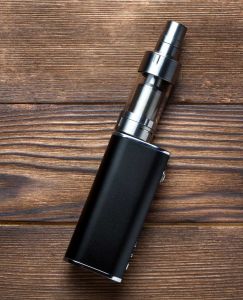WHAT YOU SHOULD KNOW ABOUT THE RECENT US OUTBREAK OF “VAPING-RELATED”
RESPIRATORY INJURY
LIAF scientific committee’s position
CATANIA, 22 Ottobre 2019-What is happening in the United States of America (18 deaths linked to lung diseases) is most certainly due to contamination of cannabis products for inhalation (“vaping”) with dangerous adulterants (in many cases solvents for Vitamin E tocopherol) sold in the USA black market. Both the FDA (Food and Drug Administration) and the CDC (US Centers for Disease Control and Prevention) now acknowledge that the outbreak resulting in hospitalizations for severe respiratory illnesses, including 18 deaths, that occurred during these past months are caused by the use of counterfeit cannabis liquids. There is no evidence that conventional, commercial nicotine e-liquid has ever caused acute lung intoxication.
Nonetheless, the US epidemic has triggered a generalized “vaping hysteria”, a scaremongering campaign directed against nicotine vaping products, which has spread all over the world. These spreading concerns were mainly fueled by misleading news provided by the US news media that defy basic principles in epidemiology and have targeted e-cigarettes and conventional vaping products. “The harm is in the presence of dangerous adulterants in the cannabis e-liquid, not in the device or in the nicotine e-liquid” – said Riccardo Polosa , Director of CoEHAR, Center of Excellence for the Acceleration of Harm Reduction.

The Scientific Committee for Research applied to electronic cigarettes of the Italian Anti-Smoking League, provides here below ten useful tips to better face the constant media pressure that spreads misleading news on the effectiveness of electronic cigarettes and their dangerousness.
10 useful tips by LIAF Scientific Committee
- Permanently quitting smoking and advising others to do so is the healthiest and fairest choice.
- If you cannot quit smoking by yourself, contact a specialized public anti-smoking center where, among the recommended therapeutic options, there will also be the option to switch to vaping which represents a harm reduction choice.
- If you are a vaper and you have quit smoking, do not return to conventional cigarettes.
- Remember that combustion is the worst enemy; both electronic cigarettes and heated tobacco cigarettes are less harmful than smoking because they do not produce the carcinogens associated with combustion.
- Always buy your products from a reliable supplier.
- Avoid buying unregulated products; all legal e-cigarette products in the EU have been registered through the EU TPD regulation.
- If you want to eventually quit nicotine use, try to gradually decrease the nicotine concentration in the liquids up to the point of using nicotine-free liquids, without increasing your daily liquid consumption and without risking relapse to smoking.
- If you suffer from any particular lung disease, consult a doctor.
- Always critically check the authority of the information you receive.
- If you are unable to quit smoking, rely on smoking cessation professionals
THC Oils – What happened in the USA?
The vast majority of the hospitalized patients and some of those who have died, provided their doctors with a pre-treatment declaration in which they confirmed that they had used THC oils. These oils may contain extremely dangerous substances (such as vitamin E acetate, possibly dissolved in oils) added to dilute THC liquids by some suppliers on the black market. Other contaminants, such as pesticides, have also been found in THC cartridges. Unfortunately, these kinds of oils, if inhaled, can cause acute and severe lung inflammation, which has been manifested as lipoid pneumonia or other types of non-infectious inflammatory reaction, which has been the cause of numerous deaths. The illicit practice of using THC oils is not a one-off, but reveals a behavioral pattern. The US authorities have already identified part of the illegal production chain and have arrested the offenders.
Why vaping hysteria can do harm?
The ultimate goal of health professionals around the world is to lead millions of people to quit smoking. Switching to less harmful alternatives (e.g. e-cigarettes) may serve this purpose. The misleading flow of confusing reports, fueled by irresponsible media outlets and negligent health authorities, about the danger of vaping products is confusing the public. Many potential switchers will continue to smoke and many e-cigarette users will consider going back to tobacco cigarettes because of this situation. This may have negative consequences for public health as it will slow down the decline in smoking prevalence.
Why vaping is safe?
Millions of people around the world regularly vape or have been vaping conventional e-cigarette products, both nicotine-containing and nicotine-free, which mainly use vegetable glycerine and propylene glycol. E-cigarettes have been around for more than ten years and such an outbreak has never occurred. Basic epidemiological principles dictate that this outbreak cannot be caused by products which have been used, and are still used, by millions all over the world for many years, The current outbreak has to be related to oils, which usually are not added to conventional e-cigarette liquids. Propylene glycol and vegetable glycerine are alcohols, not oils. The scientific evidence indicates that the aerosol emissions of electronic cigarettes, although not risk-free, are by far less harmful compared to tobacco smoke.
LIAF Scientific Committee
Riccardo Polosa – LIAF Scientific Advisor
Umberto Tirelli – National Cancer Institute Aviano
Fabio Beatrice – Italian Society of Tobaccology
Emmanuele A. Jannini – University of Tor Vergata, Rome
Carlo Cipolla – IEO (European Institute of Oncology)
David Nutt – Imperial College London
Sally Satel – American Enterprise Institute
Kostantinos Farsalinos – University of Patras
Jacques Le Houezec – University of Nottingham
Marcus Munafo – University of Bristol
Pasquale Caponnetto – University Hospital “Policlinico – Vittorio Emanuele”, Catania
Mario Malerba – University of Piemonte Orientale, Novara
Giancarlo Antonio Ferro – University of Catania
Ezio Campagna – President of LIAF




